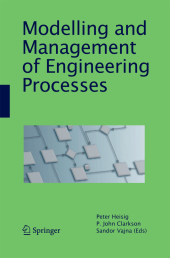 Neuerscheinungen 2014Stand: 2020-02-01 |
Schnellsuche
ISBN/Stichwort/Autor
|
Herderstraße 10
10625 Berlin
Tel.: 030 315 714 16
Fax 030 315 714 14
info@buchspektrum.de |

P. John Clarkson, Peter Heisig, Sándor Vajna
(Beteiligte)
Modelling and Management of Engineering Processes
Herausgegeben von Heisig, Peter; Clarkson, P. John; Vajna, Sándor
2010. 2014. xii, 213 S. 235 mm
Verlag/Jahr: SPRINGER, BERLIN; SPRINGER, LONDON; SPRINGER 2014
ISBN: 1-447-15717-6 (1447157176)
Neue ISBN: 978-1-447-15717-5 (9781447157175)
Preis und Lieferzeit: Bitte klicken
Modelling for Business Improvement contains the proceedings of the First International Conference on Process Modelling and Process Management (MMEP 2010) held in Cambridge, England, in March 2010. It contains contributions from an international group of leading researchers in the fields of process modelling and process management.
This conference will showcase recent trends in the modelling and management of engineering processes, explore potential synergies between different modelling approaches, gather and discuss future challenges for the management of engineering processes and discuss future research areas and topics.
Modelling for Business Improvement is divided into three main parts:
1. Theoretical foundation of modelling and management of engineering processes, and achievements in theory.
2. Experiences from management practice using various modelling methods and tools, and their future challenges.
3. New perspectives on modelling methods, techniques and tools.
Engineering Process Management in Theory.- What is a Process Model? Reflections on the Epistemology of Design Process Models.- Uniqueness and the Multiple Fractal Character of Product Engineering Processes.- Approaches for Process Attendant Property Validation of Products.- Managing Complex Engineering Processes.- An Approach Towards Planning Development Processes According to the Design Situation.- Process Model Based Methodology for Impact Analysis of New Design Methods.- Design Process Planning by Management of Milestones and Options with a Design Attainment Model.- The Effect of Uncertainty on Span Time and Effort Within a Complex Design Process.- Evaluating the Positive and Negative Impact of Iteration in Engineering Processes.- Managing Product and Process Information.- An Operational Perspective for Capturing the Engineering Design Process.- Sparse Data Estimation in Complex Design Processes.- Deriving Event Graphs through Process Mining for Runtime Change Management.- Assessment of Design Tools for Knowledge Capture and Re-use.- Engineering Process Management in Practice.- Modelling the Quality of Engineering Designs.- Continuous Improvement of Mechatronic Product Development Processes.- Interactive Visualisation of Development Processes in Mechatronic Engineering.- Management of a Design System in a Collaborative Design Environment Using PEGASE.- Towards a Robust Process for Integrating Innovations into Vehicle Projects.
John Clarkson is Professor of Engineering Design and Director of the Cambridge Engineering Design Centre at the University of Cambridge, UK. After receiving a PhD in Engineering (Electrical Machines) from the university, he spent seven years as Manager of the Advanced Process Group for PA Consulting Group´s Technology Division. His current research interests are in engineering design, particularly the development of design methodologies to address specific design issues. Peter Heisig is a senior research associate in the Cambridge Engineering Design Centre at the University of Cambridge, UK. He has previously worked for the Fraunhofer Institute for Production Systems and Design Technology, and in 2005 he founded eureki (European Research Center for Knowledge and Innovation) - a network of experts to help organisations improve the usage and creation of knowledge for innovation. Sandor Vajna is Professor and Chair of Information Technologies in Mechanical Engineering at the Otto-von-Guericke University in Magdeburg, Germany. His research areas include integrated product development; engineering process models; product modelling by feature technology and parametrics; product optimisation using evolutionary methods; engineering systems integration; CAD/CAM systems application and migration; and calculation methods and tools of the economic viability of new technologies.


